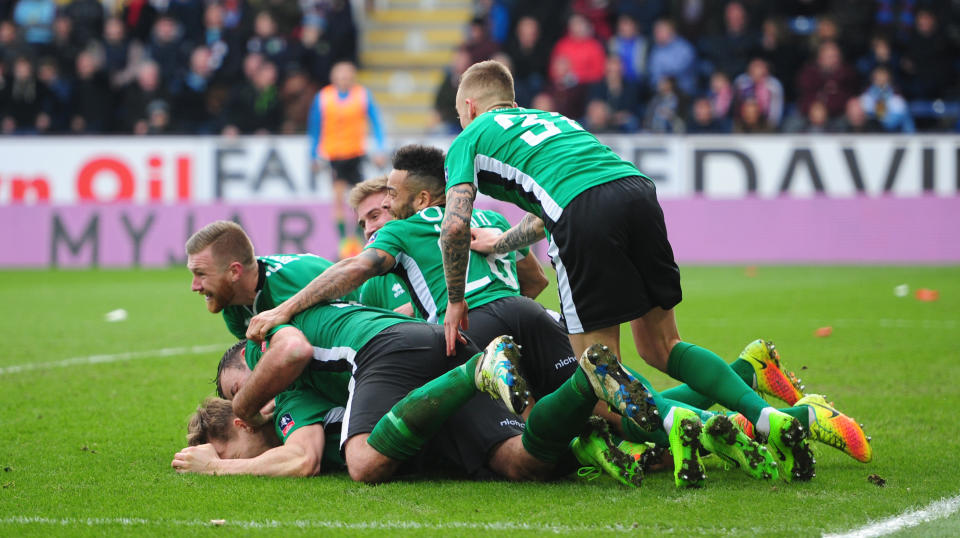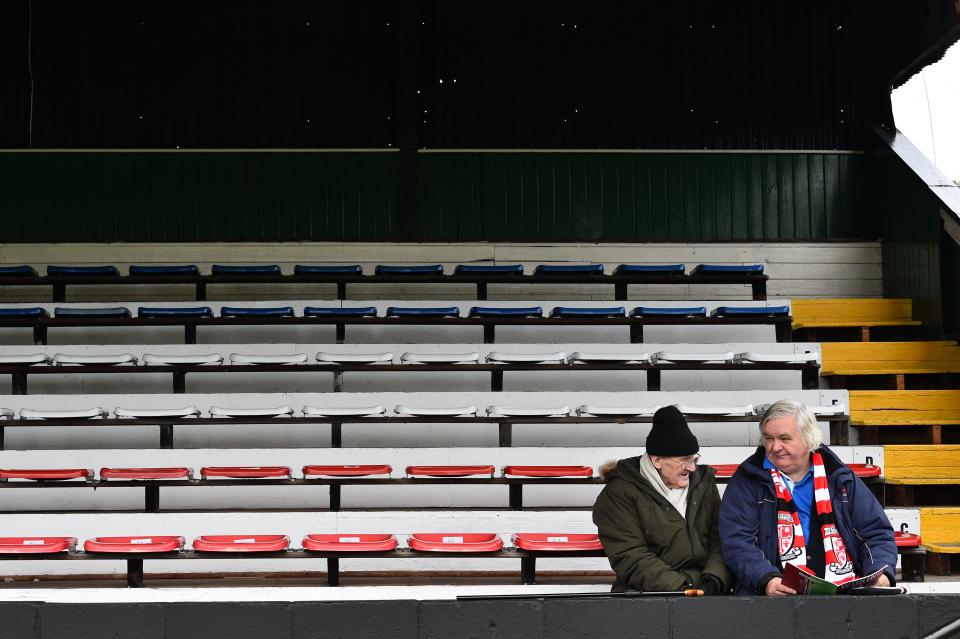'Magic moments': why the FA Cup matters for Non-League clubs

Written by William Pickworth, Yahoo Sport UK intern
Havant and Waterlooville leading Liverpool twice, Sutton United’s run to the fifth round in 2017, Hereford defeating Newcastle: The FA Cup – the rare occasion the wider British footballing public samples the endeavours of Non-League footballers.
But what is life really like for those in the Non-League pyramid, balancing full-time work with their love of football, and what does the FA Cup mean?
“In Non-League, people forget about you – the FA Cup gives you that chance”, explains Jorome Slew, current top scorer in the competition with eight goals and crucial to eighth-tier Maldon and Tiptree’s record-breaking run to the Second Round.
“People realise Non-League isn’t a joke and it gives great exposure to talented footballers.”
Slew’s thoughts are echoed by Danny Bassett, the prolific Tooting and Mitcham United marksman, who has backed up last year’s 24 goals with 16 more this campaign.
READ MORE: FA Cup Fourth Round Draw
Bassett said: “It’s a crazy experience, the FA Cup is about magical moments and it just gives you hope and something to look forward to each season.”
Both Bassett and Slew experienced these ‘magical moments’ this year with Bassett scoring the winner for Tooting in a Third Qualifying Round victory over Dorking, who play two divisions above, whilst Slew scored a crazy goal, dribbling the full length of the pitch to dump out League Two Leyton Orient, 75 places above Maldon in the football pyramid in the First Round.
“To score the winner was an unreal feeling and it was one of the goals I will never forget. My phone was flooded with messages after,” Bassett said.
NO WORDS NEEDED ⚪️⚫️ pic.twitter.com/Andq17DJCp
— Tooting and Mitcham United FC (@OfficialTmufc) September 21, 2019
Slew added: “When the whistle went my emotions were everywhere. It’s a feeling you can’t describe.
“My family were really proud of me – they’d seen me struggle with football and it was amazing to share that moment with them.”
Maldon faced Newport County live on the BBC in the Second Round and narrowly lost 1-0 but it was an unforgettable experience for Slew.
He said: “I’d never had anything to the extent of the coverage we had, it was the biggest game I’ve ever played in.”
These FA Cup memories are the pinnacle of Non-League football, yet the weekly grind can be tough.
Even finding the right team to play for can be challenging, something which Hertfordshire-based Biggleswade Town captain Matt Ball, who works in Central London, experienced when he played for Hendon.
He said: “I was having to get a train, a tube, then an Uber to training then I was having to get a lift home with someone to get picked up by my parents who would then drop me at the station to pick up my car and then go home. It was just a nightmare and wasn’t worth the time.
“Location comes into play massively when you’re deciding on a club. Playing for a team further away is going to cost an extra amount of money travelling there for training and matches.
“I don’t play Non-League football to earn loads of money, you earn a wage, but I just enjoy playing and I want to make it logistically work with me.
“People’s personal lives take priority with their work, their families and then Non-League maybe comes third.”

Balancing football and work can take its toll, with Biggleswade facing up to 10 midweek games a season.
Ball added: “We played Lowestoft in Suffolk, I had to leave work three hours early and then after the game we got home at two am and then you’ve got to go into work at normal time the next day.
“You’re shattered, but you’ve got to maintain your work standards.”
Players can even miss training or games due to their job, with a variety of careers prevalent in Non-League, none more glamorous perhaps than Maidenhead defender Remy Clerina.
The Frenchman, whose career began at Lorient before a trial match in Paris led him to Histon in England, followed by spells at Brackley and Braintree combines playing football with being an international model, working for brands such as M&S and Timberland.
His modelling commitments have taken him as far as the Bahamas and Indonesia which have led to him missing training and games, emphasising the work-football realities in Non-League.
Clerina explained: “Modelling is a very good job for me. It’s my main income, football is my passion but that’s not what makes me live.
“One game I travelled back from South Africa on the day and played football – it’s not easy.
How to wear Men's Tailoring ? @NewLook_Men @soulartistmgmt , @SelectModelMgmt @Jasonsoul1#MODELSofSOUL #menstyle #menfashion #model pic.twitter.com/glSk7I4nI8
— Remy Clerima (@remyclerima) October 7, 2016
“It means I have to work even harder and play well so the manager will allow me to miss a training session to go to a job and come back and play.
“I have good teammates who understand, and they actually joke about me doing catwalks.”
Ball added: “You have players that are school teachers, so they go on holiday at the start of August as that’s when they can – so it’s very different.”
Location is an issue which came to the forefront for Tooting’s Bassett, when in the summer he secured an exciting move up two divisions to Concord Rangers of the Conference South.
However, he left after three weeks due to personal reasons.
Bassett explained: “I’d have to finish work at 4:30 to get there for training at 7:30 and I couldn’t leave work at that time so I couldn’t stay.
“You have to feed your family first before you can play football that’s the reality of Non-League.”
The 24-year-old re-joined Tooting and has since given up his job installing alarms in his final push to turn pro.
He said: “It’s my last chance to follow my boyhood dream and at least if it doesn’t work, I will know I tried 100%.
“It’s everything I’ve ever wanted in life and I feel that my complete happiness will be when I’m pro.”
Slew also harbours hopes to move into the professional game, something which he briefly experienced as a scholar at Sheffield United.
He’s scored 27 goals for Maldon this season, where he has gained the nickname ‘Maldon Messi’, revitalising his career following a tough time when he was released by The Blades aged 19.
Jorome Slew - they call him the Maldon Messi! 💨#FACup pic.twitter.com/EcIgBdcsFh
— Match of the Day (@BBCMOTD) November 29, 2019
Research shows that youngsters in football academies are more likely to get hit by a meteorite than make it as a professional footballer.
Slew reflected: “As a scholar at a pro club you’re blinded to the reality of what can happen in football.
“At the time I was injured, out of contract and struggling mentally and financially.
“Playing Non-League, it hits you that not everything is as easy as it was at a Pro club where you get everything done for you in nice facilities - you turn up to stadiums that look like a bombsite.
“You have to deal with this - it matured me as a man.”
Ball, a creative midfielder, also dropped out of the professional game where he appeared for Norwich City, captaining their youth team with opponents including Raheem Sterling and Paul Pogba before a spell at Stevenage and reiterated Slew’s comments.
He said: “I think it’s about adapting. Non-League isn’t all ‘let’s play 10 passes at the back on a nice pitch’.
“It’s ‘we’re going to turn up to a s***hole and we’re going to have to kick it long in the wind and the rain’.
“You either adapt or you don’t – it won’t be perfect and normally you’ll be training and playing on s**t pitches, have s**t changing rooms and cold showers but that’s what it is.”
Ball is settled in Non-League but Slew’s ambition shines on bright.
Slew said: “To be professional is the goal – right now I’m happy at Maldon, but the time might come when the right move arrives. I want to play as high as possible in the future.”

 Yahoo Sport
Yahoo Sport 





































